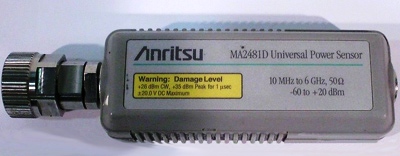
|
|
The Anritsu MA2481D 6 GHz True RMS Sensor has a dynamic range of 80 dB. This power sensor can be used for average power measurements on CW, multi-tone and modulated RF waveforms such as 3G, 4G, and OFDM. The sensor architecture consists of three pairs of diodes, each one configured to work in its square law region over the dynamic range of the sensor. Therefore, it measures true RMS power regardless of the type or bandwidth of the modulation of the input signal. Option 1 provides TDMA measurement capability, calibrating one of the diode pairs for linearity over a wide dynamic range, thus making it a truly universal sensor. Specifications. Frequency Range: 10 MHz to 6 GHz. Dynamic Range CW: –60 dBm to +20 dBm. SWR: <1.90; 10 MHz to 50 MHz, <1.17; 50 MHz to 150 MHz, <1.12; 150 MHz to 2 GHz, <1.22; 2 GHz to 6 GHz. Sensor Linearity: <3% 10 MHz to 6 GHz, <1.8% CW with Option 1. RF Connector Type: N (m). Maximum Input Power: 26 dBm, CW; 35 dBm, 1 µs peak, ±20 Vdc.
|